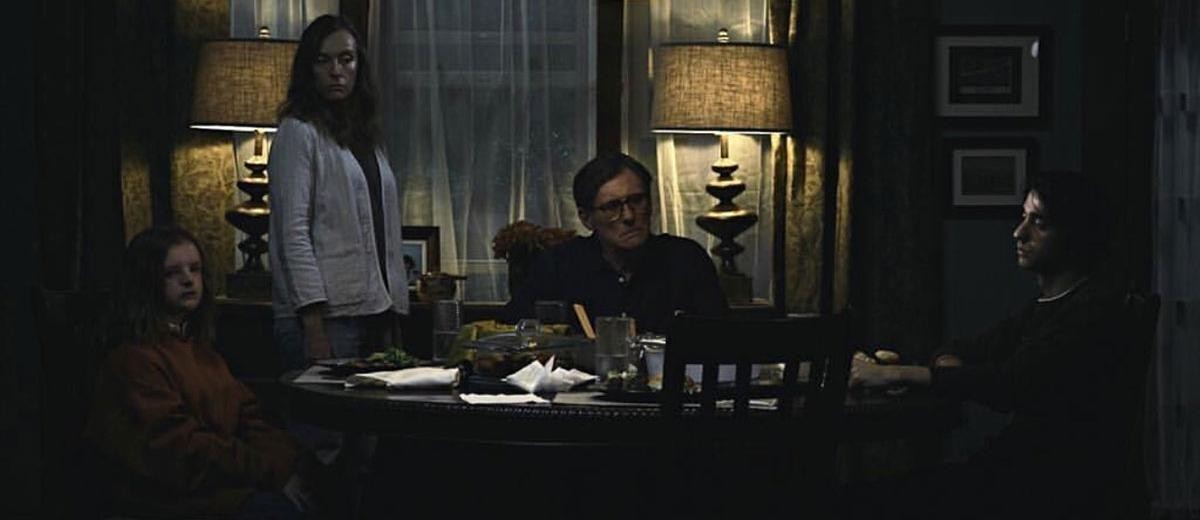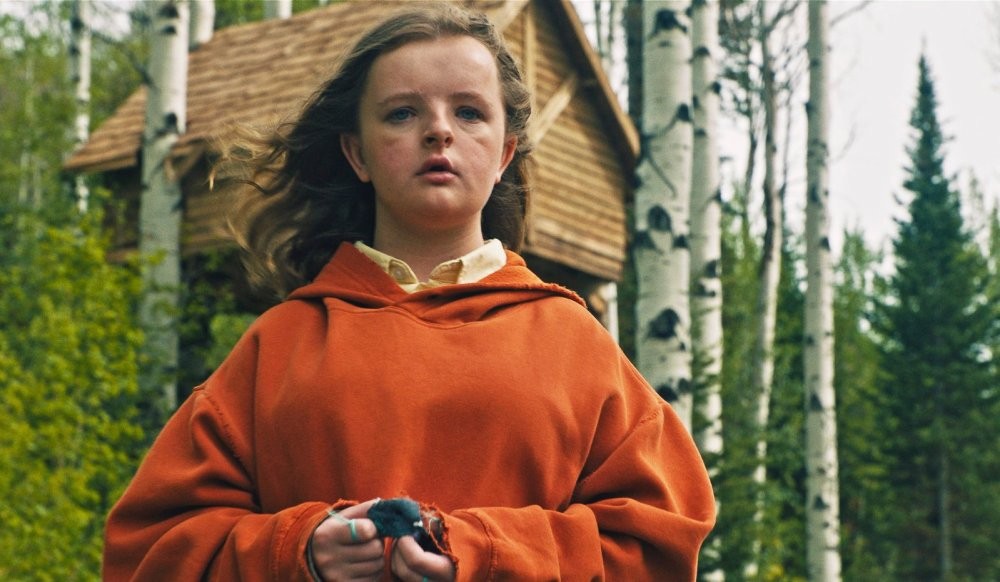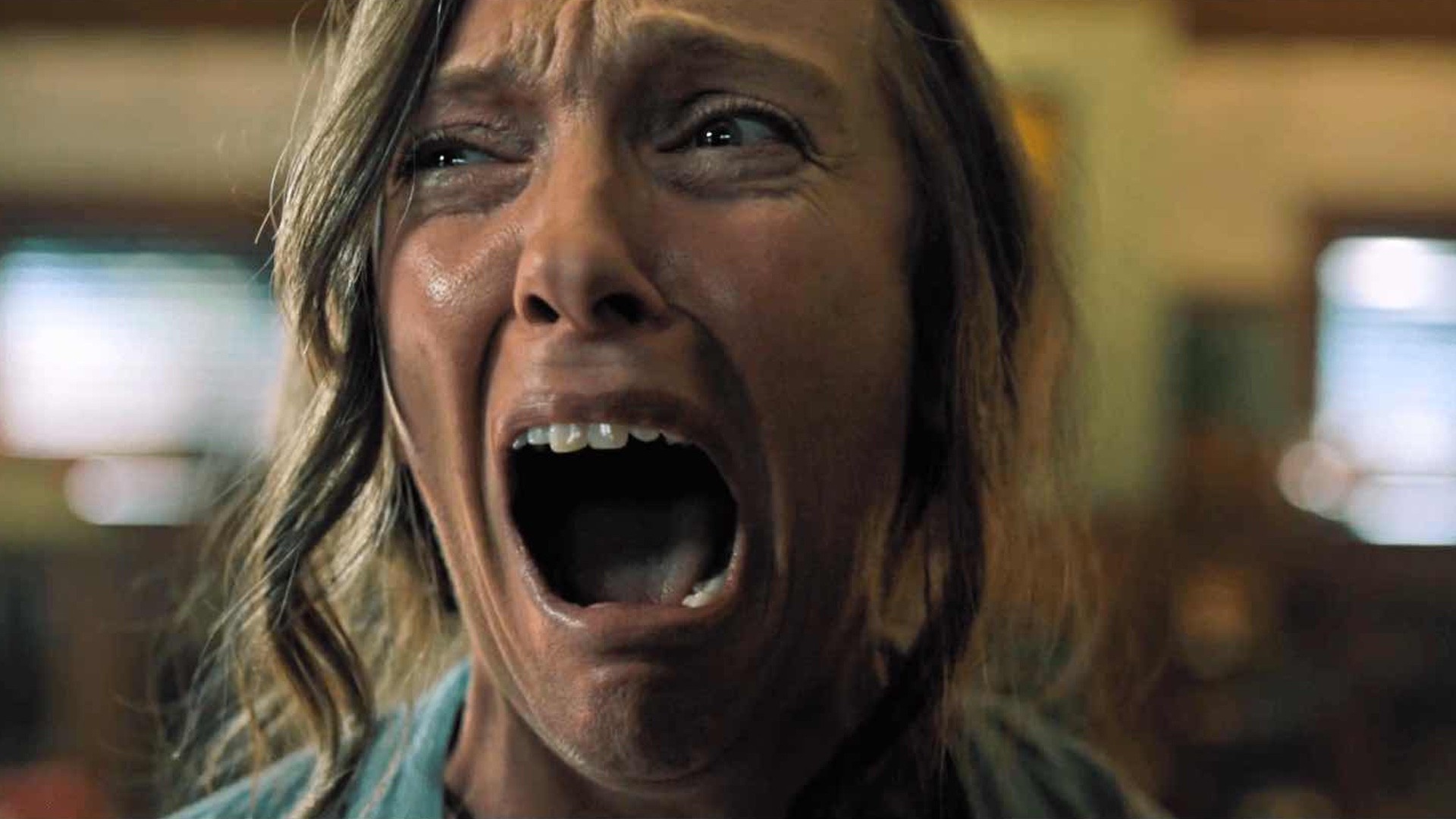Leo Tolstoy opened Anna Karenina with the line “Happy families are all alike; every unhappy family is unhappy in its own way.”

(left to right) Milly Shaprio, Toni Collette, Gabriel Byrne, and Alex Wolf as the not-so-happy family in Hereditary.
This holds true for the family of Annie Graham (Toni Collette) in Hereditary. In fact, I’d venture to guess that no family has faced similar unhappiness, with the possible exception of Mia Farrow and John Cassavetes in Rosemary’s Baby. The film begins with the family preparing for the funeral of Ellen Leigh, Annie’s mother who just passed away at age 78. Even though she lived in the Graham’s large country home as she descended into dementia in the last few years, she and Annie were not what you’d call close. Annie’s surprised that the funeral for the this “secret and private woman” is so well attended.
It’s clear from the outset that, despite the outward trappings of affluence, this is not a healthy group of people. Dad Steve (Gabriel Byrne) looks perpetually crushed by the weight of his responsibilities. Teenager Peter (Alex Wolf) is a stoner who looks generally unwell, with splotchy skin and a perpetually sweaty demeanor that is especially alienating compared to his well-scrubbed, suburban classmates. Strangest of all is 13-year-old daughter Charlie (Broadway actress Milly Shapiro), who hides behind an unruly mop of hair and makes tiny dolls out of junk and scraps.

Milly Shapiro as Charlie
As for Annie, she is an artist who recreates scenes from her life in detailed miniatures. She’s got a big show coming up, and the deadline pressure—represented by a series of passive aggressive voicemail messages from her gallery representatives that doubles as Hereditary’s only attempt at comedy — is starting to get to her. Soon after her mother dies, she starts sneaking out of the house to attend survivor’s grief group therapy instead of working on the little dioramas of family tragedy that litter her attic.
Annie’s dioramas give director Ari Aster an opportunity for experimentation within his austere style. Almost all of the effects in Hereditary are in camera (or are such artfully produced CGI that it fooled me). Aster uses tilt-shift —a technique from still photography that uses a specially constructed lens to mess with the viewer’s depth perception—to blur the lines between the film’s base reality and Annie’s memories in miniature. The director couples his analog visuals with exceptional sound design, laying his arresting images on a bed of creaks and whispers.
Aster is not obsessed with building a better jump scare. He’s making horror hay out of the dread of family dysfunction and that subtle but unshakable feeling leftover from childhood that you’ve done something wrong that you don’t know about, but you’re about to get punished for it anyway. Secrets and spirits reach from beyond the grave to manipulate the living in almost every scene of Hereditary, in ways that are subtle but, in retrospect, become strikingly obvious.

Toni Collette screams real good.
Hereditary is short on gore but long on general creepiness. What makes it work are the performances, particularly Toni Collette’s commitment to playing a parent whose family is disintegrating around her while her sanity is fleeing. Audiences have talked about how this film stays with them after the credits roll, and I think that’s largely due to Collette’s blood and guts, leave-everything-on-the-screen efforts. There have been great screamers before—such as the mother-daughter duo of Janet Leigh and Jamie Leigh Curtis, for whom the term “scream queen” was coined — but Collette takes it to the next level with a guttural howl from the depths of her putrefying soul. Aster uses her pain as the main ingredient in a unique horror alchemy that is part family drama, part Wicker Man, and part panic attack.
Hereditary